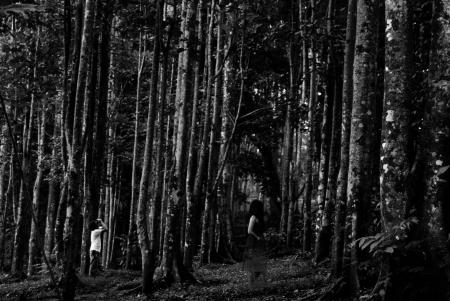Serendip is an independent site partnering with faculty at multiple colleges and universities around the world. Happy exploring!
Web Event 4: Ecological Literacy, Fear, and the Horror Genre

For my final project, I want to reflect on a big part of the way I think a lot of us think about the environment (occasionally without admitting it to ourselves). To do this, I have to examine something that we haven't touched on so much in class: fear. One thing I kept coming back to this semester but never really found the time to talk about was the fact that I was having a hard time fully embracing the attitude of "love your environment, go outside and frolic in it" and the occasional "...or you're a bad person" that some of our readings seemed to imply. This is mostly because my journey to familiarize myself with the outside world contained a great deal of fear that I had to overcome, and I don't believe that I could be one of the only ones that experienced this.
Walking blind around Morris Woods is a helpful and familiarizing experience, and taking the advice of a "Field Guide to Getting Lost" and choosing to be lost to gain an experience is an interesting idea, but what if we were actually lost? What if we actually found ourselves unable to see in the darkness, lost in an unfamiliar forest at night? "Lost" would seem a lot less glamorous and a lot more scary. This is the approach I have been wanting to take for a while. My journey to connect with the environment has included accidental shark encounters, whitewater near-death experiences, and sleeping in the open air in unfamiliar woods full of unfamiliar sounds. The pastoral or analytical visions of the natural world were not important to me at those times, and although they were at other points, I can't seem to ignore the fear that has also shaped my experience.
The lens of the horror genre is a very useful thing to look at to try to examine this fear and, potentially, why we so often leave it out of our academic discussion about the environment. Horror tropes exist because they are things that touch on very personal and sometimes unconscious fears, and by cataloguing the ones that are centered around the environment, I hope to be able to expand our academic discussion from this semester in one of the only ways we did not attempt to do so. First, I will outline various important tropes and analyze them from the perspective of a reasonably experienced person at interacting with and participating with the environment. Then, I will examine these factors together to see what they collectively have to say about our attitude toward the environment that we may or may not be ignoring.

The animating plant concept is a pretty prominent horror trope. I used a picture of a Venus Fly Trap to represent how it is rooted in actual biology, but most of the time, this trope involves quickly-growing vines wrapping around the ankles of a victim trying to flee or a flower that mimics scents and sounds to cause confusion and fear among the characters. A really interesting example of this trope is from horror writer Scott Smith's novel The Ruins. This example is fascinating because rather than portraying his plant as something magical or as a fantastical monster, Smith's plant behaves much in a way a real plant would. This plant uses human fears about real things to create a situation of terror that anyone reading this novel could identify with, which makes this particular plant even more horrifying than the usual slasher-fic magic vines. This vine moves slowly, wrapping itself overnight around open wounds, drawn to blood, and diffusing its spores in the air, sticking on clothing and spreading.
This concept is successful in the books and movies it participates in because even the most experienced nature-lovers can come across things they do not recognize in the wilderness. These things can be dangerous and they can be unpredictable and there is usually no way to protect oneself flawlessly from them. Humans and animals are, to us, allowed to move and think and have action, but ants are not. The idea of plants acting much like animals do is frightening to people because it is an example of the environment subverting our human knowledge that gives people much-needed security in a very insecure environment.

This trope is arguably an obvious one to analyze. "The Haunted Forest" is an extremely recognizable horror trope even to most who are not familiar with the genre. Even Harry Potter includes a "forbidden forest." Haunted forests provide another layer to the discussion of "getting lost" as this situation suggests being lost not in a pleasant way, but in a hopeless, terrifying, impossible way. This is what I usually imagine when I think of "being lost." The concept of a haunted forest has lasted so long in the genre because it plays on basic human fears of helplessness and being hunted, but amplifies these fears into something that includes being in a realm (the environment) that people are unfamiliar with and sometimes apprehensive of. The trope can be divided into two separate concepts. In some interpretations, the haunted forest is a forest filled with monsters that is generally not escapable or navigable. In others, the trees themselves are alive and the forest lives as an entity to psychologically play tricks on its victims. Here, since I have already discussed living plants, I am more interested in the eternal, inescapable dark forest listed first.
A couple really striking examples of this trope are Supernatural's Purgatory and the forest of the Evil Dead. The latter is interesting because the forest becomes haunted in direct result of the actions of people. After reading from a book, the forest becomes infested with spirits and demons. This is significant because it twists the idea of the haunted forest to be a more relevant fear in modern times. Most people are familiar with the real problem of human exploitation of the environment, and warnings against this usually include the fact that if people continue to misuse natural resources, there will be unpleasant consequences of some sort. Creating a haunted forest through human action is a reflection of this concept that, through the increased prominence of environmentalism, is very present in people's minds.
The former, though, successfully displays humanity's fear of this trope by rendering the haunted forest as not somewhere to be lost in, but the setting of all of Purgatory. In this there is no way to escape being lost because the forest is literally all there is. It is punishment through eternal confrontation with the unknown. The forest is filled with monsters because it is apparently where monsters go when they die, so the fear of the hunter is used to make the forest a frightening setting, but it is significant that there are no human-built aspects of this world and that it is simply an eternal forest. A dark and unfamiliar forest is the worst, most terrifying setting to be really lost in because, simply, people are scared of the environment. This is probably why people are more likely to explore the woods in daylight than at night, normal rustling sounds make hikers jump, and nobody learns about deep-sea creatures with the lights off. The world gets dark and other things make noise, but people are uncomfortable with these very normal things and prefer to consider the environment in terms of things that make them comfortable. A "wilderness," even, is spoken about in an academic setting as more of an expanse of land untouched by humanity than something that could inspire fear and a sense of being frighteningly lst in a person that might find themselves inside of it

The accidental zombie apocalypse is one of the most common horror tropes. It can be caused by almost anything, according to the genre. There has even been an occurrence of a zombie plague being spread by language with the infection living in specific words. However, the most prominent (and, especially for this project's purpose, the most interesting) cause of a zombie plague in horror is something in nature that humanity has newly discovered and harnessed for medicine. A good example of this is the film 28 Days Later (the origin of the title picture). The zombie virus was found in a group of chimpanzees that scientists decided to take into the human sphere for research purposes and it backfired. The protagonist wakes up in an empty hospital a month later to discover that the actions of these scientists have caused society to crumble under the zombie infection. This is a really telling trope, because the fear behind the success of it reflects the comfort people experience in separation from the natural world. The separation of the spheres of the "human world" and "nature" fuels this fear. Our world involves cleaning products, thick walls, and artificial sweetener, but the environment is dirty, unpredictable, and uncontrollable. There is in result this mentality that we as humans are separate from the rest of the world and should never "mess with nature" and let its danger and unpredictability into our clean, safe sphere.
Some people are so focused into this sphere that the idea of something in the natural world entering the human world and infecting the population is an actual, conscious fear. For others, the reason this trope is so successful and used so often is that the idea of not knowing enough about what's really out there and the effects those things could have on humanity is itself a pretty frightening thing to think about. People develop this concept of control in which they can determine exactly what happens to them inside the human sphere, and the idea of something in nature being revealed and coming in to destroy that control is the exact antithesis to their philosophy. Therefore, the lack of control over the environment is mainly the worry that fuels the success of the subgenre of zombie stories.
What these tropes (and many others) have in common is that they gain their influence and power from fear of the environment. This semester, when we examined our environment and how to participate in it we looked at it from every perspective except a perspective of apprehension. We looked into the concept that the pastoral interpretation of the environment is inadequate and that we should really place ourselves inside of the natural world instead of glamorizing it as a place we go to visit. We even read arguments that suggested the concept of separate spheres of human and natural is a fallacy and that we should look at the world in a way that suggests that there is no difference between the two. One thing we surprisingly failed to touch on relating to this is the reason as to why people have attempted to separate these spheres in the first place. That reason is fear.
There is an entire genre dedicated to reflecting the collective fears of humanity, and a lot of that genre is dedicated to fears that people have about environment-related things. In fact, as I explore in this project, some of the most successful tropes of the horror genre have their roots in environmental topics. My conclusion here is that the separation of the spheres that a lot of the creators of our readings seem to dislike is actually okay sometimes, because in order to recognize comfortably that the spheres may not actually exist and may actually be negative things to have as part of one's philosophy, people have to ignore some very basic fears about the outside world that most everybody in this world has to some degree. Academic understanding of the environment and the way people interact with it would be greatly improved if, instead of lightly blaming the attitudes of separatism some people have on being uninformed and unaware of the natural world, the discussion oriented itself around the reasons why a lot of people hold these views. If ecological schools of thought generally included the fact that, yes, nature can be scary, and it is basic human fears that cause people to think this rather than irresponsibility, the concept of attaining ecological literacy would be more accessible and inclusive.



Comments
fear
It's not the case that "we examined our environment...from every perspective except a perspective of apprehension"; see, for starters, Jamaica Kincaid, "Alien Soil"; Evelyn White, "Black Women and the Wilderness"; Carl Anthony and Renée Soule, "The Multicultural Approach to Ecopsychology"; our Halloween discussion of these texts, and their analysis of wherefrom fears of the natural world...